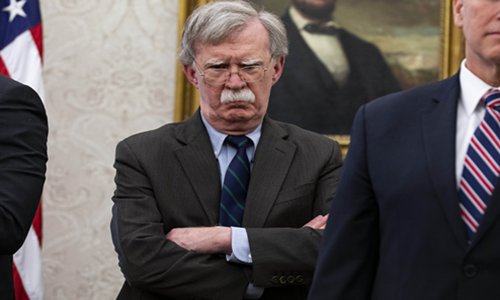HOME >> OPINION
Bolton exit won’t dent US diplomacy
By Zhang Tengjun Source:Global Times Published: 2019/9/15 18:53:39

Photo: IC
US President Donald Trump tweeted on September 10 that he fired national security advisor John Bolton, saying "his services are no longer needed at the White House" and "I asked John for resignation." But minutes later, Bolton in his own tweet said he "offered to resign" on the night of September 9, and that Trump told him, "Let's talk about it tomorrow." In any case, the career of the "war maniac" in the White House has temporarily come to an end.
This was not the first time Bolton had to give up his position in the government, but the most dramatic one. Bolton's departure was not a surprise. Many people predicted the failure of the Bolton-Trump partnership from the outset. Trump and Bolton's different explanations for the departure show they were not as close as previously believed.
There are many explanations for Bolton's exit. Trump said on Twitter that he "disagreed strongly" with many of Bolton's suggestions and "as did others in the Administration."
Trump's cabinet is being rejigged more frequently than before. One of the primary reasons for officials' dismissal was that they did not live up to Trump's expectations. Trump appointed Bolton not because the bellicose diplomat showed loyalty to him. Actually, there was not much overlap previously between the two. Trump wanted to use Bolton to lead the charge in the domains of diplomacy and security. However, he soon sensed Bolton's unruly war instinct.
With regard to the North Korea nuclear issue, Bolton has become a hurdle to substantive dialogues between Trump and North Korean leader Kim Jong-un. His provocative rhetoric and moves have irritated Pyongyang, affecting Trump's plan to make a historical breakthrough in North Korean nuclear issue. From Trump's perspective, US Special Representative for North Korea Stephen Biegun and US Secretary of State Mike Pompeo tend to be more reliable consultants. Therefore, Bolton had been excluded from the core decision-making circle of North Korea policy for a long time.
In terms of the Iranian nuclear issue, both Trump and Bolton advocated a tough stance, but they have nothing else in common. Trump hopes for a better Iranian nuclear deal and tends to force Tehran to yield by slapping sanctions; while Bolton wants a regime change by force. Such differences between Trump and Bolton have also been seen on the Venezuelan issue.
Trump is a good trader. He is obviously not willing to fight an expensive war that is not worth the cost. This is why he called off a military strike on Iran at the last minute. But Bolton, who is bigoted and paranoid, was not thinking like Trump, and instead, doggedly tried to change Trump's mind. That sealed his fate.
Discord between Bolton and other members of the Trump cabinet has accelerated his exit. Pompeo has been at odds with Bolton over national security policymaking for a long time, and disagreement between Bolton and Biegun has grown increasingly. The indifference of Treasury Secretary Steven Mnuchin to Bolton's ouster also indicates the foreign policy hawk's isolation. In fact, Bolton had never aligned with anyone since he entered the White House. As such, when he was facing a crisis of confidence, nobody was on his side.
So what does Bolton's departure mean? Many observers believe that the hawk's exit is a good thing for American diplomacy. However, Bolton has never been a game changer and Trump is the decision-maker. In an editorial, The Guardian said that Bolton's departure is "good riddance, but the problem is his boss."
The main architect and standard-bearer of US diplomacy is Trump. The president, with his "America first" doctrine, withdrew from multilateral systems, undermined global governance, weakened alliances and bullied other countries. His foreign policy, in a sharp departure from the past, has dampened US international reputation and status. This is beyond Bolton's reach. Long before Trump took office, he opted for "America first" oriented foreign policies and has never changed since then. Bolton hardly had achievements since he served as the national security adviser and exerted limited influence on Trump. It's fair to say he didn't bring any substantive change to the Trump government, nor will he leave a diplomatic legacy.
For Trump, Bolton was only a tool used to test the outside acceptance of some extreme ideas. Bolton had long harbored radical and extreme diplomatic and security views and his ideological intransigence is well-known. Without Trump's consent he was unable to survive 520 days in the White House. Bolton is the one being used in his relationship with Trump. If it wasn't Bolton, there will be a different figure of his kind. The White House advisor Peter Navarro is a Bolton in the field of economic affairs to some extent.
Bolton has left and few would miss him. The Trump government is going to welcome a fourth national security advisor. Will he or she bring any change to US diplomacy? The answer is probably no.
The author is an assistant research fellow at the China Institute of International Studies. opinion@globaltimes.com.cn
Posted in: COLUMNISTS